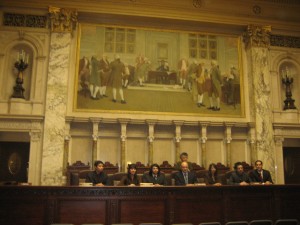Conference on the Wisconsin Supreme Court: Review and Preview
At the beginning of this semester, I proposed that the law school host a conference on the Wisconsin Supreme Court. Dean Kearney lent his support and we were fortunate enough to obtain the co-sponsorship of the Appellate Practice section of the State Bar of Wisconsin.
So yesterday we hosted a sold out gathering of over 100 lawyers for “Conference on the Wisconsin Supreme Court: Review and Preview.” Our meeting began with a plenary panel discussing the question of judicial recusal predicated on campaign contributions and speech. The discussion was moderated by the Hon. Diane Sykes (L’84) of the Seventh Circuit Court of Appeals and the panelists included Attorney Robert Henak (who has filed motions to recuse Justice Michael Gableman is connection with certain campaign ads and support), along with our own Chad Oldfather and me. Much of the discussion focused on the implications of the recent decision in Caperton v. A.T. Massey Coal Co. and the recent consideration by the Wisconsin Supreme Court of competing rules on recusal.
This discussion was followed with breakout panels discussing business and criminal law cases, respectively.

 Yesterday was another full day for the
Yesterday was another full day for the